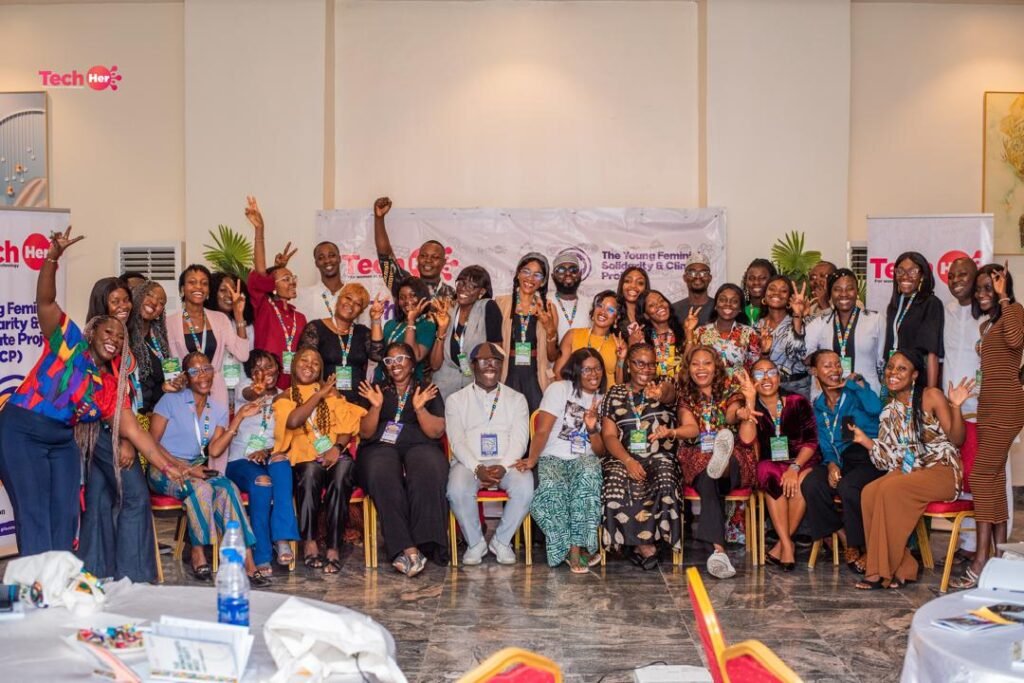2
The Women, Earth and Equity (WEE) Climate Workshop: Evergreen Cohort has concluded in Port Harcourt, marking another milestone in advancing gender-responsive climate leadership across Nigeria.
Building on the success of the earlier Savannah Cohort, the workshop reflects a growing national movement linking gender justice with climate action through collaboration, shared learning, and inclusive engagement.
Organised by TechHer with support from the Ford Foundation, the two-day convening brought together ecofeminists, environmental advocates, and community leaders from across Southern Nigeria to develop strategies for promoting climate justice through equity-driven approaches.
Participants engaged in intensive sessions on feminist environmental leadership, sustainable resource management, and integrating gender perspectives into climate policy.
Facilitators underscored that achieving meaningful climate action requires addressing deep-rooted inequalities, not just reducing emissions, stressing that true sustainability must be grounded in fairness, inclusion, and systemic change.
Flora Asieri, leading the session on Funding Justice and Sustainability in Practice, applied this framework to how climate initiatives are resourced.
She explained that feminist funding principles embody this deeper approach, stating that “Feminist funding principles are about more than just giving money, they are about centring marginalised communities, ensuring participation, and supporting long-term change.”
Asieri challenged participants to think beyond short-term project cycles, arguing that climate funding should enable structural transformation rather than temporary fixes.
Building on this foundation, Dr Dikibujiri Ibim Diri connected these principles to the core concept of sustainability itself. She reminded participants that true sustainability must guarantee future generations’ access to the same opportunities available today without compromising planetary capacity. According to her, this intergenerational perspective reinforced the workshop’s emphasis on solutions designed for lasting impact rather than temporary relief.
Peter Akinnusi, Head of Programmes at TechHer, explained how these ideas underpin the organisation’s broader approach.
“The people most affected by climate injustice are often those at the margins, and they must be at the forefront of finding solutions.
“Our goal is to furnish them with the tools and networks to organise for change and access the resources they need.”
He added that the WEE Workshop operates under TechHer’s Young Feminist Solidarity and Climate Project (YFSCP), with crucial support from the Ford Foundation.
“Through the YFSCP, we are equipping young ecofeminists to advocate for gender-responsive climate policies and influence local and regional agendas. It represents a significant step for Nigeria, and indeed West Africa, in building a movement that puts justice at the centre of climate action.”
The workshop’s integrated approach produced tangible shifts in participants’ understanding and practice. During a post-event reflective session, Opeyemi Oluwaseun, a health sector professional and climate activist, described a change in his work approach.
“I never truly understood the intersection between climate change and health. This event was a turning point, providing me with a profound understanding of the critical link and, more importantly, equipping me with new strategies to advocate differently and better.”
Beyond theoretical sessions, participants collaborated in a Pitch Lab to develop actionable advocacy plans addressing equitable resource distribution, grassroots mobilisation, and gender-responsive environmental policy. These practical exercises translated the workshop’s conceptual frameworks into concrete strategies participants could implement in their communities.
The workshop concluded with a creative performance by spoken word artist Ruth Bassey Okim, whose piece called for enhanced governance and accountability in environmental management, reinforcing the event’s message that systemic change requires both grassroots organising and institutional transformation.
Also, Gladys Omenefu, Project Lead for the Young Feminist Solidarity and Climate Project (YFSCP), emphasised TechHer’s long-term commitment:
“What we are building seeks to go beyond convening events; we are keen on seeding a movement of young feminist leaders who are determined to make climate justice a lived reality.”
She also expressed gratitude to the Ford Foundation team for their instrumental support in advancing this national climate movement.
The Evergreen Cohort marks another milestone in the Women, Earth and Equity Climate Workshop series, a growing national platform for young feminist leaders to share knowledge, strengthen advocacy, and shape equitable climate policies.
Together, these workshops form part of a broader movement seeking to redefine what climate leadership looks like across Nigeria: inclusive, intersectional, and community-led.
Read the full article here


